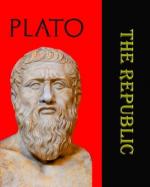|
|
The Republic Major Characters
Socrates: The main speaker/philosopher in the book, he incites his audience and leads them to follow his chain of thought by asking them leading questions. Here, Socrates is leading the discussion to find out the difference between justice and injustice, and to find out which leads to the better life. He is determined to come up with a final result without leaving any stone unturned. However, he also wants to convince his audience of his findings and answer every single one of their questions to the best of his capabilities. Through his logical reasoning and many examples, he does come to a very convincing conclusion.
Glaucon: One of Socrates' friends who travels with him to the Piraeus, and then attends the entire discussion about justice, the soul, and the good, asking questions to clarify the unclear, and answering questions to further Socrates' dialectic method. He is also extremely interested in finding out what true justice is and what the good life really is, and is willing to pursue this with Socrates all the way to the end.
Thrasymachus: Part of Socrates' audience, he claims that justice is 'the advantage of the stronger.' Although Socrates disagrees with this, he takes up the claim and examines it. Throughout the dialogue, Thrasymachus challenges Socrates several times and often becomes angry because he thinks that Socrates is trying to fool his audience, or ignore a point that will him wrong and prove Thrasymachus right.
Minor Characters
Polemarchus: Cephalus' son. Socrates and Glaucon meet at his house to join others and then attend a festival. This leads to the discussion about justice and the good that is forcefully pursued by Socrates.
Cephalus: A wise old man whom Socrates turns to for advice. Cephalus begins the discussion about happiness in old age, which then leads to a discussion of happiness generally, and then justice and the good life. Unfortunately, he leaves after the first book, so his contribution is very limited.
Charmantides: One of the guests at Polemarchus' house, who becomes part of the audience when Socrates begins deliberating about justice and the good.
Lysias: One of Polemarchus' brothers, who is also at the house when Socrates arrives, and is also part of the audience to the discussion.
Euthydemus: One of Polemarchus' brothers, who is also at the house when Socrates arrives, and is also part of the audience to the discussion.
Clitophon: One of the guests at Polemarchus' house, who becomes part of the audience when Socrates begins deliberating about justice and the good.
Simonides: One of the philosophers Polemarchus quotes when attempting to define justice. According to Simonides, justice is 'giving each his due'.
Adeimantus: One of the people participating in the discussion, who doesn't agree with Socrates that justice is better than injustice. However, Socrates does, through questions and answers, show Adeimantus that his initial judgment was incorrect, and that justice is truly better than injustice.
Delphi: An oracle who speaks only the truth, and who can foretell the future.
Er: Socrates uses the story of Er, a soldier who died in battle, went to the afterworld, and came back, to show how great the rewards for being just are in the afterlife.
Lachesis: One of Necessity's daughters, she resembles the past and is an important part of the story of Er.
Clotho: Necessity's daughter, the past. Clotho is also an important part of the story of Er; she turns the spindle.
Atropos: Another of Necessity's daughters, Atropos resembles the future, and she also turns the wheel of the spindle.




